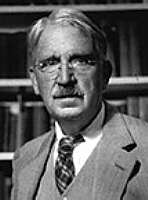
(1859-1952)
Educated in his native Vermont and at Johns Hopkins
University, John Dewey enjoyed a lengthy career as an educator,
psychologist, and philosopher. He initiated the progressive
laboratory school at the University of Chicago, where his reforms
in methods of education could be put into practice. As a
professor of philosophy, Dewey taught at Michigan, Chicago,
and Columbia University. He was instrumental in founding the American
Association of University Professors as a professional organization for
post-secondary educators.
Drawn from an idealist background by the pragmatist influence of Peirce and
James, Dewey became an outstanding exponent of philosophical naturalism.
Human thought is understood as practical problem-solving, which proceeds by
testing rival hypotheses against experience in order to achieve the "warranted
assertability" that grounds coherent action. The tentative character of scientific
inquiry makes Dewey's epistemology thoroughly fallibilistic: he granted that
the
results of this process are always open to criticism and revision, so that
nothing is
ever finally and absolutely true.
This approach provides a significant opportunity for progress in morality
and
education, however. In "Logical Conditions of a Scientific Treatment of Morality"
(1903), for example, Dewey tried to show how moral precepts develop and
function as confirmable hypotheses. Democracy and Education (1916)
describes
in detail how an ability to respond creatively to continual changes in the
natural
order vitally provides for individual and community life. Dewey's social theories
shaped during his long association with George Herbert Mead.